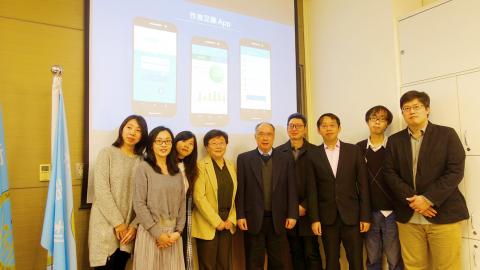Staring at smartphones before going to bed affects sleeping patterns, delays circadian rhythms and reduces the total sleep time, a study by the National Health Research Institutes (NHRI) found.
On average, every hour of smartphone screen time throughout the day will delay bedtime by 4.9 minutes and reduce the total sleep time by 5.5 minutes, and that screen time right before bed affects sleeping patterns the most, Lin Yu-hsuan (林煜軒), a physician at the Institute of Population Health Sciences, who headed the research team, said yesterday.
The 2017 Nobel Prize in Physiology or Medicine was awarded for the discoveries of molecular mechanisms controlling circadian rhythms, which pointed out that irregular sleep patterns might increase the risk of psychiatric and physical illnesses, Lin said.

Photo provided by the National Health Research Institutes
The team, which included researchers from the NHRI, National Taiwan University Hospital, Mackay Memorial Hospital, Chiao Tung University and Dan Jiang University, developed an app, called “Rhythm,” that continuously and automatically records the user’s daily smartphone usage and sleep patterns in an objective setting and over a long period.
The team used the app to record the phone usage and sleep patterns of 61 people ranging in age from 20 to 56 for 14 consecutive days.
Results of a questionnaire given to the participants showed an 84 percent correlation to the statistical analysis gained from data collected by the app, Lin said.
While the average screen time before bed accounts for only 14.3 percent of the total daily screen time, it accounts for 44 percent of the impact on sleep, Lin said.
Other research studies have found that light exposure significantly impacts circadian rhythms and circadian rhythm disorder can increase health risks, including mental illness, metabolic diseases, cardiovascular diseases and breast cancer, Lin said.
The team’s research showed that screen time before bed significantly affected circadian rhythm, he said.
Studies in other countries have also suggested people avoid staring at their smartphone, PC or tablet screens and fluorescent light sources after 9pm, or at least avoid smartphone use one hour before bed to prevent a negative impact on sleep quality, Lin said.
This is largely because exposure to light suppresses the secretion of melatonin, a hormone that influences circadian rhythms, Lin said.
The research was published last month in the Journal of Psychiatric Research.

Taiwanese can file complaints with the Tourism Administration to report travel agencies if their activities caused termination of a person’s citizenship, Mainland Affairs Council Minister Chiu Chui-cheng (邱垂正) said yesterday, after a podcaster highlighted a case in which a person’s citizenship was canceled for receiving a single-use Chinese passport to enter Russia. The council is aware of incidents in which people who signed up through Chinese travel agencies for tours of Russia were told they could obtain Russian visas and fast-track border clearance, Chiu told reporters on the sidelines of an event in Taipei. However, the travel agencies actually applied

Japanese footwear brand Onitsuka Tiger today issued a public apology and said it has suspended an employee amid allegations that the staff member discriminated against a Vietnamese customer at its Taipei 101 store. Posting on the social media platform Threads yesterday, a user said that an employee at the store said that “those shoes are very expensive” when her friend, who is a migrant worker from Vietnam, asked for assistance. The employee then ignored her until she asked again, to which she replied: "We don't have a size 37." The post had amassed nearly 26,000 likes and 916 comments as of this

New measures aimed at making Taiwan more attractive to foreign professionals came into effect this month, the National Development Council said yesterday. Among the changes, international students at Taiwanese universities would be able to work in Taiwan without a work permit in the two years after they graduate, explainer materials provided by the council said. In addition, foreign nationals who graduated from one of the world’s top 200 universities within the past five years can also apply for a two-year open work permit. Previously, those graduates would have needed to apply for a work permit using point-based criteria or have a Taiwanese company

The Shilin District Prosecutors’ Office yesterday indicted two Taiwanese and issued a wanted notice for Pete Liu (劉作虎), founder of Shenzhen-based smartphone manufacturer OnePlus Technology Co (萬普拉斯科技), for allegedly contravening the Act Governing Relations Between the People of the Taiwan Area and the Mainland Area (臺灣地區與大陸地區人民關係條例) by poaching 70 engineers in Taiwan. Liu allegedly traveled to Taiwan at the end of 2014 and met with a Taiwanese man surnamed Lin (林) to discuss establishing a mobile software research and development (R&D) team in Taiwan, prosecutors said. Without approval from the government, Lin, following Liu’s instructions, recruited more than 70 software